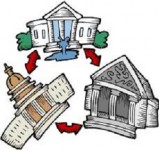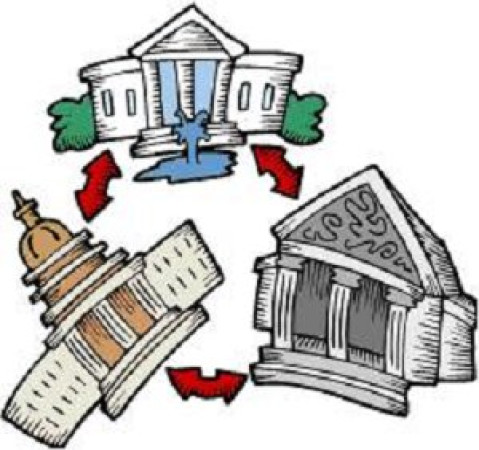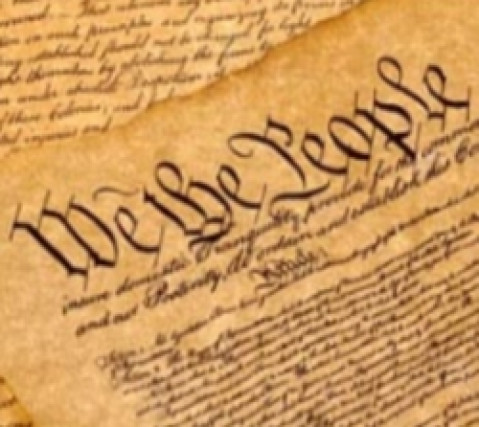Widgetized Section
Go to Admin » Appearance » Widgets » and move Gabfire Widget: Social into that MastheadOverlay zone
Civility, Civic Literacy and Public Service
There is a robust debate underway about what it will take to attract the best and brightest of our young people to public service. As someone who has taught public affairs for 15 years—and with several years of government service in my own background—I have a theory that I would sum up as “civility, civic literacy and a meaningful opportunity for service.”
By “civility,” I mean a collegial and supportive workplace in which partisan political considerations take a back seat to achievement of the common good. By “civic literacy,” I mean familiarity with accepted understandings of America’s history and constitution. And by “a meaningful opportunity for service,” I mean an approach to administrative practice that balances ends and means in pursuit of the public interest.
There was an interesting symposium on political civility in a recent issue of PS: Political Science and Politics. The articles wrestled with some foundational questions: what is the difference between the sort of argumentation that illuminates differences and is an inevitable part of democratic discourse and rhetoric that “crosses the line”?
 The consensus seemed to be that incivility is rudeness or impoliteness that violates an agreed social standard.
The consensus seemed to be that incivility is rudeness or impoliteness that violates an agreed social standard.
I’m not sure we have agreed social standards in this age of invective, but surely rhetoric that focuses on and disrespects persons rather than positions should count as uncivil. An example of civility in political argument might be Indiana Senator Richard Lugar’s often-repeated phrase to the effect that “that is a matter about which reasonable people can differ.”
The contributors offered a variety of perspectives on the definitions and causes of today’s nasty politics, but one of the most trenchant observations came from a Professor Maisel of Colby College, who attributes the gridlock in Washington and elsewhere to “partisan one-upmanship expressed in ways that do not show respect for those with differing views.”
In other words, if your over-riding motivation is simply to beat the other guys–to keep the President from a second term, for example–and if that motivation outweighs any concern for the public good, civility is absent and governing is impossible.
The reason politicians no longer “respectfully disagree” with each other, Professor Maisel points out, is that they do not in fact respect the views of their opponents. For a variety of reasons, they hardly know them, and it’s easy to demonize people you don’t know.
Add to that an even more troubling aspect of today’s politics, a lack of civic literacy abetted by disregard for fact and truth and enabled by partisan television, talk radio and the internet. Survey after survey shows that people on the left and right alike get their “news” from sources that validate their biases. Worse, we have lost much of the real news, the mainstream, objective journalism that fact-checks, that confronts us with inconvenient realities. In such an environment, it becomes easier to characterize those with whom we disagree as buffoons or worse, unworthy of our respect. It is easier still if we lack even an elementary grounding in the origins and philosophy of American government, a lack confirmed by one dispiriting survey after another.
Only 36 percent of Americans can correctly name the three branches of government. Fewer than half of 12th grade students can describe the meaning of federalism. Only 35% of teenagers can correctly identify “We the People” as the first three words of the Constitution. Nearly 94% of teenagers in one survey could name the Fresh Prince of Bel Air, but only 2 percent could name the Chief Justice of the Supreme Court. Anecdotal surveys such as these, as well as the few formal studies that have been completed on civics, point to what has been called a “civics recession.” Barely a quarter of the nation’s 4th, 8th and 12th graders are proficient in civics. Only five percent of high school seniors can explain checks and balances. Only 43% of high school seniors can name the two major political parties; only 11% knew the length of a Senator’s term; and in one survey, only 23% could name the first President of the United States.
There is ample additional research confirming the existence of a worrisome civic deficit. If nature abhors a vacuum, as the old saying has it, it should not surprise us that citizens accept the spin and outright fabrications of the pundits and “talking heads” who have political axes to grind.
When political discourse is so nasty, and regard for truth so minimal–when the enterprise of government has more in common with a barroom brawl than a lofty exercise in statesmanship–is it any wonder that so many of our “best and brightest” shun politics? Forget elective office–who wants to go to work for a government agency the very existence of which is regarded as illegitimate by a substantial percentage of one’s fellow-citizens?
Americans have spent the last thirty plus years denigrating the role of government and the value of public service to an audience ill-equipped to evaluate those arguments. Now we are paying the price for our neglect of civic education and our unwillingness to defend the worth of the public sector.
Americans have a bipolar approach to issues: it’s either all good or all bad. But government is neither. We don’t have to abandon critical evaluation of government’s performance, but we do need to remind citizens of government’s importance and value.
I firmly believe in the line from Field of Dreams:if you build it, they will come. If we rebuild civic knowledge and respect for civility and public service, young people will answer the call.
By: Sheila Suess Kennedy
Sheila Suess Kennedy is Professor of Law and Public Policy at the School of Public and Environmental Affairs at IUPUI.
Images courtesy of http://www.squidoo.com/quiz-civics and http://staunton.k12.va.us/Page/1501.






 (1 votes, average: 4.00 out of 5)
(1 votes, average: 4.00 out of 5)
Follow Us!